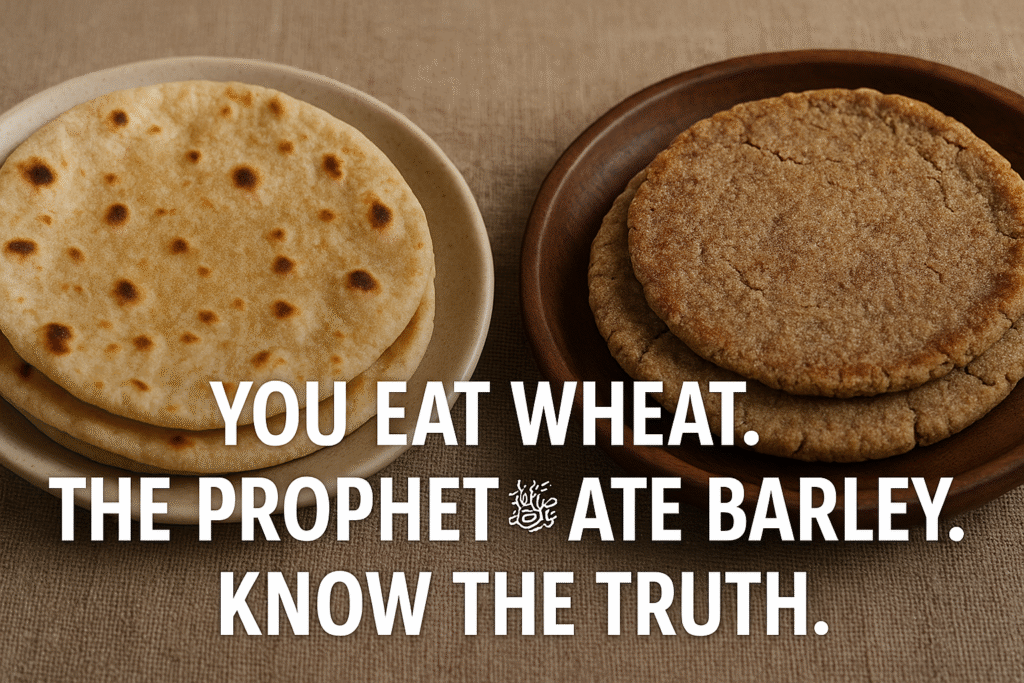
Barley flour was the grain of choice for Prophet Muhammad ﷺ — not wheat. Discover why this forgotten Sunnah holds powerful health secrets and spiritual benefits.
🕌 A Forgotten Sunnah Flour — Rediscovered
In today’s kitchens, wheat flour (gandum ka atta) is a staple. It forms the base of our rotis, bread, naans, and baked goods. But did you know that Hazrat Muhammad ﷺ never consumed refined wheat flour as we do today? In fact, the Prophet ﷺ mostly ate barley (jau) — a grain now nearly forgotten in our modern diets.
Let’s explore the reality, reasons, and benefits behind this Sunnah choice — and why barley flour (jau ka atta) is a powerful superfood for both your body and soul.
🌾 Wheat vs. Barley in Prophetic Tradition
Wheat was known in the time of the Prophet ﷺ but was rarely consumed by him. According to several authentic Hadiths, barley bread was the preferred and available food in the household of the Prophet ﷺ.
📜 Hadith Reference:
Aishah (RA) said:
“The family of Muhammad ﷺ never ate their fill of wheat bread for three consecutive days from the time he came to Madinah until he passed away.”
— Sahih al-Bukhari
Instead, barley bread — coarse, unrefined, and full of nutrients — was the primary source of grain. This choice was not based on lack but on Sunnah simplicity, health, and spirituality.
🌟 The Health Benefits of Barley Flour (Jau Ka Atta)
Modern science is now proving what the Prophet ﷺ practiced 1400 years ago. Here are the unique benefits of barley that refined wheat lacks:
✅ 1. Low Glycemic Index
Barley digests slowly, releasing sugar steadily — ideal for diabetics and weight management. Wheat, especially refined, spikes blood sugar.
✅ 2. High in Soluble Fiber (Beta-Glucan)
Barley contains beta-glucan, a special fiber that lowers cholesterol, improves heart health, and boosts immunity.
✅ 3. Gut Healing Power
Barley improves digestion, helps relieve constipation, and strengthens the digestive tract — unlike wheat, which can cause bloating in some people.
✅ 4. Anti-Inflammatory & Cooling
In Islamic Tibb (medicine), barley is considered mild and cooling, which is why it was used in Talbina — a porridge prescribed by the Prophet ﷺ for emotional and physical healing.
✅ 5. Naturally Gluten-Low
Barley contains less gluten than wheat, making it more suitable for people with gluten sensitivity.
🍲 Sunnah Tip: Talbina – The Healing Barley Dish
The Prophet ﷺ recommended Talbina — a warm barley porridge — for those who are sick, grieving, or recovering. It’s not just Sunnah, it’s medicine.
Hadith:
“Talbina soothes the heart of the sick and relieves some of one’s sorrow.”
— Sahih Bukhari
⚖️ Quick Comparison Table: Barley vs Wheat
| Property | Barley Flour (Jau) | Wheat Flour (Gandum) |
|---|---|---|
| Sunnah Usage | ✅ Yes (Prophetic Diet) | ❌ Rare/Minimal |
| Glycemic Index | Low | High |
| Fiber Content | High (Beta-Glucan) | Moderate |
| Gluten Level | Low | High |
| Body Impact | Cooling | Heating |
| Digestibility | Easy on stomach | Heavier |
| Emotional Healing | Yes (via Talbina) | No |
📌 Why We Abandoned Barley – And Why We Must Return
The rise of industrial food, processed wheat, and white flour (maida) pushed barley out of our plates. But we forgot that Sunnah carries both wisdom and wellness.
By reintroducing jau ka atta into your daily life — even mixing it with wheat — you can revive a Sunnah while healing your body naturally.
🕋 Final Words: Revive the Sunnah, Heal the Body
While wheat flour dominates today’s market, barley was the grain of choice for the Prophet ﷺ. Not for fashion or fad — but because it supported health, balance, and healing.
If you truly love the Prophet ﷺ, begin with the Sunnah on your plate. Replace or mix wheat with barley, cook Talbina, and feel the physical and spiritual transformation.


We must add barley flour in our daily diet. By doing so, we will not only follow the Sunnah of Hazrat Muhammad Peace be upon him, we will get the health benefits also.